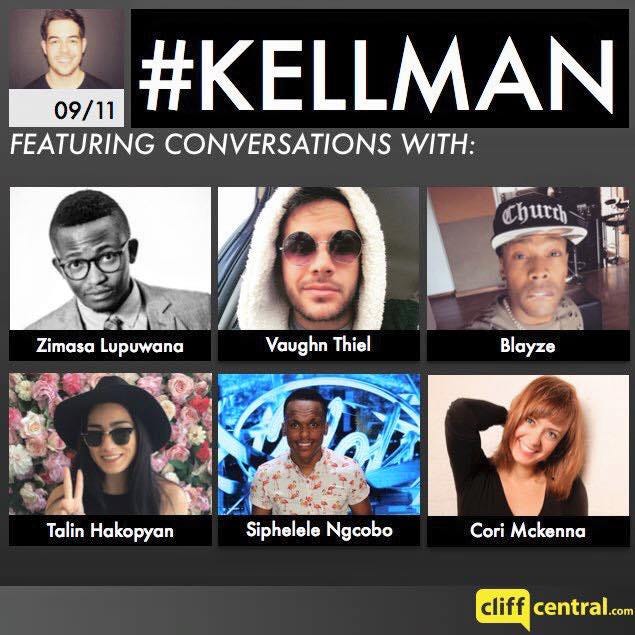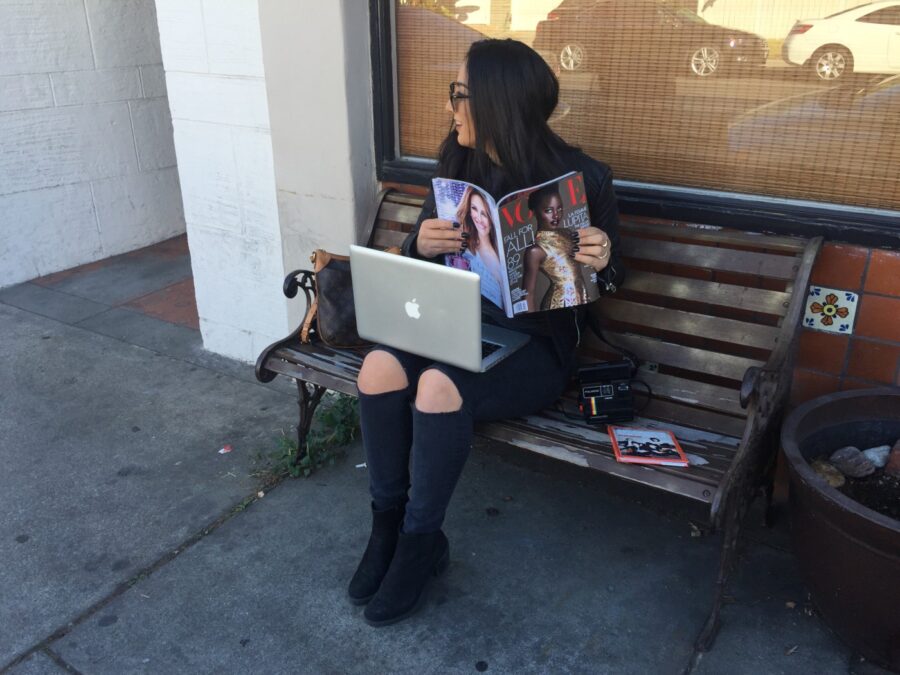It’s My 20th Birthday and I’m an Alpaca
A millennial’s take on the fall of print and the future of digital media
When I first stepped into the newsroom, I was a 17-year-old girl wearing a “Yeezus” T-Shirt, had a subscription to “Vogue,” a Twitter account with over 1,000 followers, and no idea whatsoever how print media worked. Three years later, it’s my 20th birthday and I’m convinced that if you cut me open, an infinite amount of knowledge about journalism, the appeal and hatred of digital media, the decline of print media, and most importantly, the way people like to receive their news, will spew from my body.
At 17, my college journalism program was putting out a print newspaper, The Mountaineer, and a print magazine, Substance. At first, I didn’t even know we had any student media, so when I finally put my fear of new things behind me and walked up to the newsroom, I knew this was a step in the right direction. I took the magazine class and wrote the stories needed to pass the class. The first was a “how-to” on how to expand your music library, while others wrote articles like “how to make guacamole.” The best of the best were chosen to be published in the print edition and when I opened up the magazine and saw mine in there, I was going to make sure everyone on campus read my sheer genius.
Our way of promoting involved physically handing out the magazine to students on campus. I hated walking around campus, profusely sweating like I had just ran a 5k marathon while trying to get students to read something that we were so proud of to be met with blatant disinterest. At least my parents liked the article.
By the time I was turning 19, everything had changed. My hair was black, I had a few more piercings, and our magazine Substance had moved over to the new publishing platform Medium. A semester later, we launched an online version of our campus newspaper, and the success that is Sac.Media was born. My hair remained black though. I tell myself it was to mourn our killing off of print and the sigh of relief from trees (personification at its finest) that were being sacrificed to produce our student media.
My first story published on Substance was about the return of vinyl records. I promoted my story everywhere I could think of, and unlike the story I wrote for print about the alternative rock band Bad Suns, this one exploded online. At first, I was upset that my article about the band, who have now become the beacon of teenage fantasies, got little-to-no exposure, but the past was in the past. I became obsessed with watching my analytics, and as I watched the readership grow daily, I felt like my journalism career was taking off. People cared about what I had to say and this was just the start of my love affair with journalism.
My next story was about millennials, something I know a lot about. As the title says, I turn 20 today. In this piece, I talked about how people in their 20s love themselves first and focus on their future more than previous generations. This was a personal one for me because my mother, an Armenian native and mother of three who is only 20 years older than me, lived a completely different life than I’m living.
While she was busy raising three children at my age, I’m going to college, flying around the country to see my favorite bands, or spending days on the streets of L.A. desperately trying to get a photo with Harry Styles. The story resonated with an audience of fellow millennials who are focused more on their education and careers than getting married and starting a family.
I was somewhat relieved to know that I wasn’t the only one feeling the way I did. I offended some people and was accused of hating marriage, but I guess when you write a solid piece of journalism, you’ll receive some negativity.
I sure as hell wasn’t going to let the haters get me down.

Once again, thousands of people were reading and responding to my story. And this story still has wings. I was recently contacted by a South African podcast station to be interviewed on one of their shows. The interview was lighthearted and comical, but the amount of praise I received was indescribable. I had to get up at 7 a.m., much earlier than I wanted to on a Monday morning, but the 30 minutes I spent talking to host Arye Kellman was something I’ll never forget.
I’m sure this wouldn’t have been the case if we were still printing.
To say the very least, the move to Medium changed my life. This was a turning point for my 19-year-old self.
As a millennial, I’ve been lumped into a group of selfish, unaware, and vapid people who don’t give a shit. According to this stereotype, people like myself only read fluff, tidbits, memes and gifs. We don’t care about politics and world affairs. Certainly we don’t have the brain capacity to understand or form an opinion on the recent events occurring in Paris, Beirut and Kenya. We’re always looking at our phones and we are ignorant to our surroundings.
Which is absolute bullshit.
I’ve watched our publications grow in readership unlike anything we’ve ever experienced. And the young people reading these stories are intelligent and engaged. Print for them is dead. Most magazines don’t even have the sample perfume inserts anymore. What’s the point?
Yet the ones who should be encouraging our shift to digital media are the ones bashing us. It’s the journalism teachers, or print pushers as I like to call them, who act as if we’ve lit their campus on fire by making our publications completely digital. I remember speaking to a group of faculty at a journalism conference while wearing a “Print, What’s That?” T-shirt, a term I coined about killing out print publications. While a few applauded our innovation, others shunned us. One even said, “How can you say print is dead? It’s my life,” while clutching her newspaper.
I no longer care what the print pushers have to say. I know the truth.
My generation does not care about print. We want well written, well researched news, but we want it delivered in a visually appealing and simple way. Some make fun of Buzzfeed, but they are THRIVING. Even after my work is done, my laptop, TV, and lights in my room are turned off, I go onto my iPhone and open the Buzzfeed app. I am a Buzzfeed addict.
It’s not that I want to know if I’m more llama or alpaca, it’s that I need to know. I need to take the quiz and then assess my life on why I’m an alpaca rather than a llama. But this does not make me insane. Before I visit Buzzfeed, I’ve already completed a statistics assignment on testing hypothesis’, for a political science class on why Ben Carson, although a neurosurgeon, is not a politician, and written, edited and created multimedia for two stories. I may get my news from Buzzfeed, Vice, and social media, but I’m sure I know more about ISIS than the average person. I am not vacuous, selfish, unaware, or self-absorbed.
Anyway, back to me. I’m now 20. I’ve spent two decades on this earth. I’ve gained friends and I’ve lost friends. I’m a vegetarian. I’ve attended about 250 concerts. After nights I certainly won’t forget or remember, in some cases, I realized my drink of choice is tequila. I have two dogs, Ghost and Luna, named after characters in “Game of Thrones” and the “Harry Potter” series. I’ve become even closer to my mother and my brother than ever before.
I shamelessly devote my love for Harry Styles and Kanye West across all social media platforms on a daily basis. Manchester United is my favorite football club, and even though I’m a girl, I know a lot about the sport. I made a decision at 17 that my future lies in digital and social media, so my brain has become a sponge that absorbs everything.
That’s the thing about millennials, we are multi-tasking, multi-platform, media wizards.
Our adviser Toni Albertson showed us a video of a talk that blogger Heather Armstrong presented at the XOXO festival in Portland, Ore. After 15 years of successful blogging that supported her employees and family, she watched the bottom fall out of the banner ad model and entered the new model of sponsored content; a model that would end with her writing being censored by the sponsor.
After a fight to preserve her story and a sponsor threatening to pull out, a compromise was eventually made that would force her to remove two words from one of her Banana Republic sponsored stories: “Hairy vaginas.” This, along with a realization that she had “written her children into her contract,” resulted in the decision to walk away from this type of sponsored blogging.
I connected with Heather on a spiritual level. She had everything, but there was a price. Her dignity, her soul, and most importantly, her voice. I am a part of the generation that is disrupting traditional forms of media. I, like Heather, want to write what I want, when I want, where I want. I am my own publisher and I know my audience and how to reach them. I am an independent person and with that comes a lot of freedom and responsibility.
In the past three years, journalism has taught me more than how to construct a story or write a summary lead. It has taught me adversity. I’ve experienced success and disappointments, but it has shaped me into the person sitting behind the screen writing this article. It has taught me not to be afraid of greatness and to be fearless.
And like Heather Armstrong, it has taught me that if I want to write “hairy vaginas” in my story, I sure as hell will. After all, I’m fuckin’ 2o.







